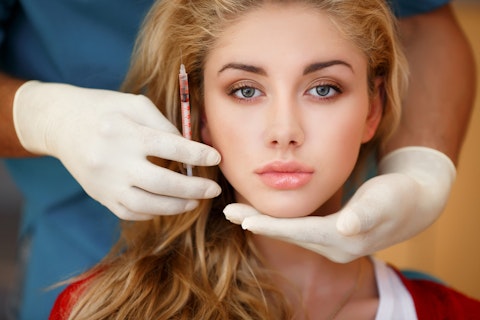We came across a bullish thesis on Evolus, Inc. (EOLS) on Substack by Greg ┃The Elevator Pitch. In this article, we will summarize the bulls’ thesis on EOLS. Evolus, Inc. (EOLS)’s share was trading at $11.76 as of May 7th. EOLS’s forward P/E was 117.65 according to Yahoo Finance.

ATeam/Shutterstock.com
Evolus has quickly positioned itself as a disruptive force in the global injectable aesthetics market, traditionally dominated by pharmaceutical giants like AbbVie and Galderma. The company’s flagship product, Jeuveau, has gained significant traction, capturing 13% of the U.S. neuromodulator market within just five years. Jeuveau’s success can be attributed to its innovative go-to-market strategy, which combines pharmaceutical credibility with direct-to-consumer (DTC) marketing techniques typically associated with the beauty industry. By offering Jeuveau at a price point approximately 20% below Botox, it has been able to resonate with a younger demographic, particularly those between the ages of 20 and 40. This pricing strategy, combined with a robust presence in over 16,000 medical practices—including a growing number of medical spas that lack strong brand loyalty—has made Jeuveau a popular alternative to Botox. This market acceptance has positioned Evolus favorably in the expanding U.S. injectables market, which is undergoing structural changes driven by greater societal acceptance, a wider demographic appeal, and an aging population with increasing disposable income.
The broader U.S. injectables market is seeing strong growth, with the popularity of non-invasive cosmetic procedures accelerating. The U.S. is expected to follow more mature markets like Korea, where injectables are already deeply embedded in cosmetic routines. This trend represents a significant growth opportunity for Evolus, which is now at a crucial inflection point in its business development. The company plans to diversify beyond neuromodulators with the upcoming launch of Evolysse, a premium line of dermal fillers developed in partnership with Symatese, the same formulation partner behind Galderma’s Restylane. Evolus is seeking FDA approval for several aesthetic indications, including lip and cheek enhancement. This expansion into dermal fillers is expected to contribute approximately $200 million to Evolus’ revenue over time, further strengthening its position in the injectables space. Moreover, Evolus is adopting an innovative subscription-based model, “Club Evolus,” which offers customers quarterly treatments for a monthly fee. This model is designed to drive customer loyalty and predictable revenue streams, providing a clear path to sustained growth. With these initiatives in play, Evolus is targeting annual revenue growth of 25-27%, with projections aiming for $700 million in revenue by 2028, up from an estimated $266 million in 2024. If the company achieves these goals, it expects to reach positive cash flow by 2026.
However, despite its promising growth trajectory, Evolus remains a high-risk, high-reward investment. Several factors introduce uncertainty, including regulatory dependencies around product approvals and manufacturing partnerships. Additionally, since all Evolus procedures are out-of-pocket and not covered by insurance, the company’s performance is sensitive to broader consumer spending trends. Economic downturns could impact discretionary spending on cosmetic procedures, presenting a potential headwind to growth. Still, if Evolus can continue executing its strategy effectively, maintain rational competition, and convert growth into sustainable profits, the company could deliver significant upside to investors. Furthermore, Evolus’ ability to capture market share in the growing injectable aesthetics sector—through innovation, branding, and consumer loyalty—positions it as a compelling investment despite the inherent risks.
Evolus stands out among its competitors, particularly Galderma, which, although boasting successful injectable brands like Dysport and Restylane, has a more diluted business model. Galderma also operates legacy divisions, including skincare products like Cetaphil, which is losing ground to competitors like L’Oréal’s Cerave, and a dermatological drug pipeline that limits its growth potential. In contrast, Evolus offers a cleaner, more focused investment thesis, solely concentrating on injectable aesthetics. While it is still smaller and must prove long-term profitability, the simplicity of Evolus’ business model and its focus on high-growth injectables makes it a more attractive pure-play investment in the sector.
Valuing Evolus is complex due to the limited number of direct competitors, but looking at mature self-pay therapeutic companies like Align, Sonova, and Alcon—whose valuations range from 13-17x EV/EBITDA—can provide some context. If Evolus reaches $700 million in revenue by 2028 and delivers an 11% EBITDA margin, which is lower than its 20% long-term target but adjusted for stock-based compensation, the company would generate approximately $77 million in EBITDA. Using a 15x EV/EBITDA multiple, this could result in annualized returns of around 20%, contingent on continued growth. However, key risks remain. Evolus relies on licensing agreements for its neuromodulator Jeuveau from Daewoong and its fillers from Symatese, both of which come with volume requirements and finite durations. Any disruptions to these agreements could create a going concern issue for the company. Moreover, competition from South Korean entrants and a fragmented filler market pose additional risks. As competition intensifies, pricing pressures could erode margins, further complicating Evolus’ growth strategy.
Another risk comes from tariffs. New U.S. import duties on products from South Korea and France could impact Jeuveau and Evolysse fillers, though they may be exempt as pharmaceuticals. If tariffs do apply, Evolus may need to raise prices by 5-6% to offset the cost increases, which could be manageable given the strong margins and pricing power of its products. Competitors like AbbVie and Galderma may also face similar tariff-related challenges, potentially leveling the playing field. Despite these risks, Evolus benefits from a seasoned management team, including executives with deep experience from Allergan, such as CEO David Moatazedi and CMO Rui Avelar. This leadership, combined with a focused business model and significant upside potential, makes Evolus a standout investment in the injectable aesthetics space. While the company must prove its long-term profitability, its focused approach and market opportunities position it for potential substantial growth in a rapidly expanding industry.
Evolus, Inc. (EOLS) is not on our list of the 30 Most Popular Stocks Among Hedge Funds. As per our database, 32 hedge fund portfolios held EOLS at the end of the fourth quarter which was 24 in the previous quarter. While we acknowledge the risk and potential of EOLS as an investment, our conviction lies in the belief that some AI stocks hold greater promise for delivering higher returns, and doing so within a shorter timeframe. If you are looking for an AI stock that is more promising than EOLS but that trades at less than 5 times its earnings, check out our report about the cheapest AI stock.
READ NEXT: 8 Best Wide Moat Stocks to Buy Now and 30 Most Important AI Stocks According to BlackRock.
Disclosure: None. This article was originally published at Insider Monkey.


